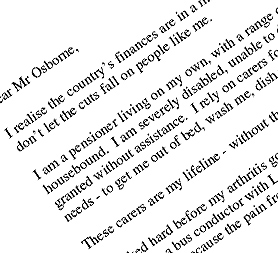Budget hits poorest hardest: one woman's story
Updated on 25 August 2010
As the Institute for Fiscal Studies (IFS) claims the coalition's emergency budget will hit the UK's poorest families the hardest, one public sector worker tells Channel 4 News of her struggle to make ends meet.

Despite chancellor George Osborne's claims that "we are all in this together", research from a leading economic think tank has today suggested that the poorest will face the most pain from his emergency budget in June.
The Institute for Fiscal Studies (IFS) showed that, once all the benefit cuts are considered, the changes in the emergency budget are "clearly regressive", as on average, they hit the poorest households more than those in the upper-middle of income distribution in cash.
But the chancellor says that, if you take into account all of the measures the coalition government is introducing - including education and social welfare reforms - this is not the case.
However Joanne Morgan, a teaching assistant from Torfaen and member of Unison, says it certainly feels like she and her children are being hit very hard by the government's plans.
Before the budget she wrote a wishlist for the chancellor via Channel 4 News.
Speaking today she said her concerns, and those of many people like her, have been completely ignored and she is now "very worried" about the future.
"There's a pay freeze, less benefits, and public sector cuts," she said. "And with the high prices of food and petrol - I'm really worried we will have to leave the house my children grew up in."
She said it was frustrating to work hard, but then face such austerity.
"I'm not one of those people, I don't think the government should just give me money," she said. "I did a part-time degree in education, and finished last year. I got a 2:1 and planned to apply for a better paid job - but all the jobs that are out there now are all temporary, and I just can't do it."
Cuts hit children
She also said she expects more cuts will hit her workplace, a special school, although the detail of the cuts have not been finalised in her area yet.
"Because of the government's inclusion agenda, we take the children on a minibus out on visits, so they can take part in mainstream education," she said. "I imagine one of the first things to go will be we have to use the minibus less, particularly with the price of diesel now."
Her own three children - one in the upper sixth form, one who has just got his GCSE results, and one in Year 9 at secondary school - also face problems as a result of the cuts, she said.
"I am very worried about their university places and funding for their university places," she said.
"The eldest is studying politics A-level and is very politically minded, but she doesn't know any different from this. She only knows uncertainty - cuts, pay freezes, and no jobs, just as she comes of age."
Ms Morgan said she understands why the government has to make cuts and changes, but feels the distribution of pain is very uneven.
"They didn't do anything to cause it - why have children got to be hit?" she asked. "They should be protected. They should know that if they work hard, they will get a university place. My children don't have a silver spoon in their mouth, they don't expect anything, but if they work hard they should have a chance."
The children at her school will also bear the brunt of cuts, she said.
"If there is less money for the school, cuts will be made. Redundancies seem inevitable," she said. "And if that happens, ultimately there will be less learning opportunities for the students."
She said she could only speak for herself on who was being hit hardest by the changes, but said: "I know how it affects me. I think I work hard, but I am reliant on things like benefits, child benefits.
"I am very worried. I have a 17-year-old and a 16-year-old. They will hopefully go to university soon. The benefits will then stop coming to me but I will still have to pay my mortgage and support them at university.
"That's why I did a degree, to help with that. But now there are no jobs."
And while some indicators have suggested the economy is improving, for Ms Morgan and others like her, it does not feel that way.
"Locally, with these cuts, it is only going to get worse," she said.

